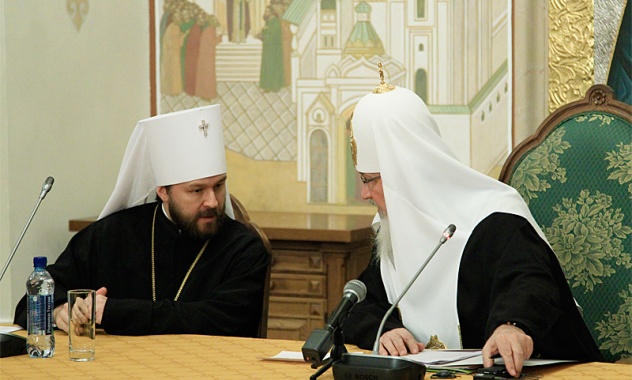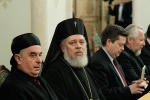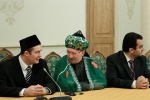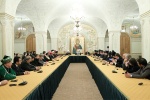Primate of the Russian Orthodox Church meets with participants in the International Conference on Freedom of Faith: the Problem of Discrimination and Persecution against Christians
His Holiness Patriarch Kirill of Moscow and All Russia met with the participants in the International Conference on Freedom of Faith: the Problem of Discrimination and Persecution against Christians. The meeting took place at the Cathedral of Christ the Saviour on 1 December 2011.
Taking part in the meeting were Metropolitan Hilarion of Volokolamsk, chairman of the Moscow Patriarchate’s Department for External Church Relations (DECR); Mr. Massimo Introvigne, representative of the OSCE on combating racism, xenophobia and discrimination against Christians; archpriest Vsevolod Chaplin, chairman if the Synodal Department for Church-Society Relations; hegumen Philaret (Bulekov), DECR vice-chairman; representatives of the Patriarchates of Alexandria, Antioch, Jerusalem and Serbia, of the Orthodox Churches of Cyprus and Greece, of the Assyrian Church of the East, the Armenian Apostolic Church, the Roman Catholic Church, the Maronite Church, the World Council of Churches, Protestant denominations, public organizations combating Christianophobia, the Muslim and Jewish communities, and of the state authorities.
The Primate of the Russian Orthodox Church noted that the cases of persecution and discrimination against Christian have become systematic. His Holiness believes that this religious community, the biggest in number in the world, finds itself in a vulnerable position. Secularist tendencies are a threat. The notions of moral standards preserved in the spiritual tradition for centuries are fiercely attacked. ‘The absolutization of personal freedom to the detriment of moral responsibility makes Christians the enemies of political correctness which equates sin with virtue,’ His Holiness explained.
Mass exodus of Christians from the Middle East and North Africa is matter of primary concern. His Holiness quoted the appeal from the Statement on the growing manifestations of Christianophobia made by the Holy Synod of the Russian Orthodox Church on 30 May 2011: ‘to develop a comprehensive and effective mechanism for protecting Christians and Christian communities who are subjected to persecution or restrictions in their religious life and work.’
“Violation of the rights of Christians and of representatives of other religions and the growth of interreligious contradictions should prompt the states to ponder over the current mechanisms of ensuring human dignity and freedom,” Patriarch Kirill said.
He added that Christians have played an important part in the stability in the Middle East and North Africa from the earliest times, by their presence there proving peaceful nature of the Muslim majority.
His Holiness proposed to develop an effective mechanism for protecting the rights of Christians and Christian communities, reminding of the initiative of the Russian Orthodox Church launched on the basis of decisions taken at the Interreligious Summit in Moscow in 2006 to set up a consultative body at the UN consisting of representatives of the major religious communities, movements and groups with a mandate to provide an adequate and highly professional expertise in case of conflicts that involve religious problems. The experts’s opinions would be brought to the UN notice and then to the national governments.
Mr. Introvigne took note of an active position of the Russian Orthodox Church on Christianophobia and promised to consider a proposal of setting up a consultative body.
Other events
-
02.12.2011 22:59(Russian) Митрополит Иларион встретился с представителем Ассирийской Церкви Востока
-
01.12.2011 23:04Communiqué of the International Conference on Freedom of Faith: the Problem of Discrimination and Persecution against Christians
-
01.12.2011 22:54(Russian) Выступление Святейшего Патриарха Кирилла на встрече с участниками конференции «Свобода вероисповедания: проблема дискриминации и преследования христиан» (Москва, 30 ноября – 1 декабря)
-
01.12.2011 22:54Primate of the Russian Orthodox Church meets with participants in the International Conference on Freedom of Faith: the Problem of Discrimination and Persecution against Christians
-
01.12.2011 21:15(Russian) Состоялось пленарное заседание конференции «Свобода вероисповедания: проблема дискриминации и преследования христиан»
-
01.12.2011 12:58(Russian) Преследования и дискриминация христиан в современном мире: причины, масштабы, прогнозы на будущее
-
01.12.2011 02:30Conference on the problem of discrimination and persecution against Christians opens in Moscow
























